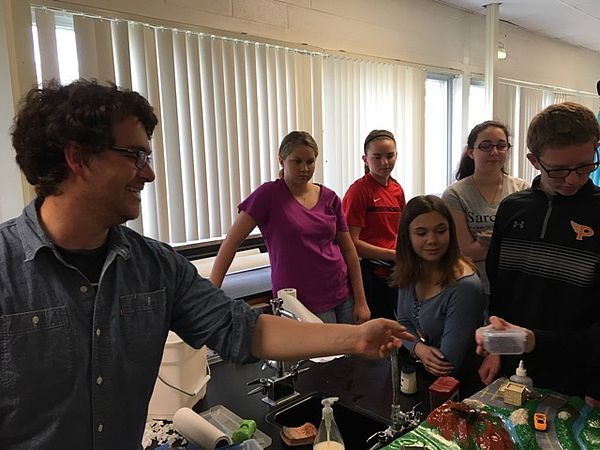LCC ECO AmeriCorps member and Education and Outreach Coordinator Dominic Brennan has spent several months conducting research and doing site visits at schools in New York and Vermont. The outreach is part of our School Stormwater Assessment Project funded through a grant from the Lake Champlain Basin Program. LCC identified four schools within the watershed that vary in population, area, location, soil types and amount of impervious land. Burlington's Rock Point School, Bellows Free Academy in St. Albans, and Plattsburgh's Bailey Avenue Elementary School and Plattsburgh High School are all participating in the program to identify stormwater issues on their campuses, provide recommendations for future solutions and increase awareness of stormwater runoff within the surrounding communities. Through the project's educational effort, Dom has taught 148 middle and high school students about watershed sciences, stormwater runoff and pollution reduction and best management practices.
With rooftops, parking lots, sidewalks and basketball courts, schools often present large areas of impervious surface. Schools are also community hubs, hosting plays, recitals, sporting events, and other public gatherings. For all of these reasons, educational institutions make perfect places to conduct stormwater assessments. Moreover, the program offers a unique educational experience for students and staff that will ultimately benefit and improve not only the water quality of Lake Champlain, but community understanding and knowledge of stormwater management. LCC's school stormwater assessment program includes collaborating with other organizations and agencies with stormwater expertise including the Lewis Creek Association, Lake Champlain Sea Grant and the University of New Hampshire Engineers Without Borders Club.
LCC's stormwater assessments consist of ascertaining the ratio of pervious to impervious land at each school campus, identifying and assessing the functionality of current stormwater infrastructure, identifying the receiving waters for the site, noting drainage patterns of soil types, and communicating to students and faculty about potential opportunities for stormwater infiltration. The in-class lessons and assessments will culminate with a report to each school that includes the current state of stormwater runoff at their campus, suggestions for any green stormwater infrastructure (GSI) installations, maps noting slope, drainage patterns, current infrastructure, and images of the campus with highlighted improvement areas.
Jeff Rouleau, Bellows Free Academy (BFA) Science teacher, who is involving his students in the stormwater assessment process, noted the importance of stormwater education at BFA due to its downtown location and limited green space. He also remarked that "[t]he stormwater assessments and in-class education provided by LCC [were a] great opportunity for my students to apply science in a real word scenario. The students were interested and engaged and have a number of references to the experience as we continue to learn more of the human impacts on the environment."
With hands on education on topics like pollution prevention and stormwater runoff, as well as the use of model watershed activities such as the Enviroscape, LCC's Stormwater Assessment Program is helping students understand the impacts of stormwater runoff and that we will always live downstream from someone else, just as there will always be someone downstream of us.
